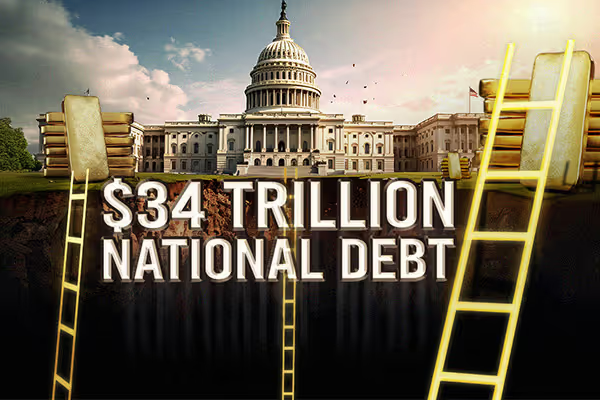President Donald Trump’s newly passed One Big Beautiful Bill Act will, by most conventional estimates, add trillions to America’s national debt to pay for permanent tax cuts. According to a report the nonpartisan Congressional Budget Office published on July 21, the bill will add $3.4 trillion to the U.S. national debt over the next decade.
And it’s not just the debt that has economists sounding the alarm. The same CBO report estimates that the law will “increase by 10 million the number of people without health insurance” by 2034. Cuts to Medicaid and SNAP benefits (food assistance) are expected to disqualify millions of low-income Americans from receiving aid, while new requirements for Medicaid and food stamps will remove even more.
As fiscal uncertainty grows, investors are increasingly looking to gold as a safe-haven asset. The precious metal, up over 27% year to date, has long been a symbol of national security as the U.S. government veers into uncharted financial territory.
Republicans argue that the bill will boost economic growth and provide much-needed relief to working Americans, pointing to provisions like tax deductions for tips and overtime pay. House Speaker Mike Johnson claimed the package was “written for hardworking Americans” and predicted that voters would reward Republicans for the law in the 2026 midterm elections.
But few economists agree. The Committee for a Responsible Federal Budget estimated the law would add $4.1 trillion to the national debt. The conservative Cato Institute projected the cost at $6 trillion. Jessica Riedl, an economist at the Manhattan Institute, called the bill “the single most expensive legislation since the 1960s.”
“The more we borrow now, the harder those decisions will be in the future,” said Dominik Lett, a policy analyst at the Cato Institute. “So if people think the changes in the bill are already draconian, it will make the future changes necessary even worse.”
That future may arrive sooner than expected. The Yale Budget Lab projected that yields on 10-year Treasury bonds — a benchmark for interest rates — will rise an additional 1.2 percentage points by 2054, due to the law. That’s expected to increase mortgage costs, consumer loan rates, and business borrowing.
Higher rates could also depress housing affordability and further delay any potential rate cuts from the Federal Reserve. Already, the central bank is under pressure — not just from economic forces, but from the White House. President Trump and his allies have openly criticized Fed Chair Jerome Powell and are mounting a campaign to replace him, citing mismanagement and excess spending at the central bank.
Meanwhile, the megabill’s social program cuts are expected to hit low-income Americans hardest. The law imposes federally mandated work requirements on Medicaid for the first time in its 60-year history and expands work requirements in SNAP. Many parents of teenagers will be forced to work or lose their benefits.
The University of Pennsylvania’s Wharton School estimated that those earning under $18,000 per year will see a 1.1% drop in income. In contrast, middle-income households earning between $53,000 and $96,000 will see a modest 1.8% increase. But economists warn that these short-term gains will come at a long-term cost.
“This isn’t just reckless — it’s fiscally criminal,” said Rep. Keith Self, R-Texas, a Freedom Caucus member who ultimately voted for the bill after receiving assurances from Trump. “We are particularly damning future generations.”
Amid all the fiscal chaos, gold has emerged as a consistent, stable option. It doesn’t depend on the whims of lawmakers or central banks. It isn’t impacted by social program cuts or partisan gridlock. Gold simply holds its value — and right now, that’s more than can be said for the U.S. dollar.
With uncertainty around interest rates, government spending, and healthcare access, many investors are turning to gold not just as an investment, but as financial protection. At Reagan Gold Group, we help clients shield their savings with IRS-approved physical gold and silver IRAs, as well as secure delivery options.
The government may be mortgaging America’s future, but gold can still protect yours.














